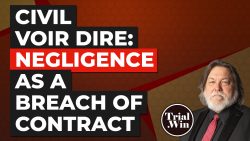By Hon. (Ret.) Ken E. Adair 
Everybody Believes a Deal’s a Deal
Video Transcribed: Hi, my name is Ken Adair. I’m a people’s lawyer and I’m a retired judge, and I want to talk to you again about civil voir dire. I talked a little bit about how you talk to the jurors about safety is no accident. Somebody did something wrong. Somebody affirmatively did something or failed to do something they were supposed to do. I also talked a little bit about how every case I’ve ever tried in a personal injury context was a contract case. I tried it as a contract case, I never called it a contract case.
 Well, one of the things I’ve Voir Dire about, and it’s probably different now than it used to be, but if you have enough older people on the jury and I asked the jury panel, I’ve asked them in every car wreck case I’ve ever tried, how many of you remember in driver’s ed when you were in school, that the instructor told you that when you put that key in the ignition and you start your car and you put your car in reverse to back out of the driveway, and the second you move your car, you have entered a contract with the rest of the people driving on the road?
Well, one of the things I’ve Voir Dire about, and it’s probably different now than it used to be, but if you have enough older people on the jury and I asked the jury panel, I’ve asked them in every car wreck case I’ve ever tried, how many of you remember in driver’s ed when you were in school, that the instructor told you that when you put that key in the ignition and you start your car and you put your car in reverse to back out of the driveway, and the second you move your car, you have entered a contract with the rest of the people driving on the road?
And I always get a few hands that raise up. Can you tell me more about that? Tell me what that means to you? Well, you have to drive safe and they have to drive safely. And if they drive safe and I drive safe, and everybody gets to where they’re going to be safe. And do you see how that’s a contract?
How many of you believe a deal’s a deal? That’s a no-brainer. That is a universal conservative value. Now I say conservative value, it’s a universal conservative value because it’s been around forever, that a deal’s a deal. Everybody believes a deal’s a deal.
If you break something, you pay for it. So I Voir Dire about those concepts, but I treat the case like a contract case. Now, Rick Friedman wrote a book called Rules of the Road. Now rules of the road apply to almost every case, whether it’s a contract case or a car wreck case, semi-truck case, medical negligence case, it doesn’t matter.
The rules of the road, there’s always rules of the road, otherwise, there’s no law, there are no public policy implications behind needing a law. But keep in mind the concept of a contract, that the deal was broken, my client followed the deal. My client kept their end of the bargain, and for some reason, my client didn’t make it home safely. And my client didn’t make it home safely because somebody breached the contract. And this goes back to safety is no accident.
The contract is I’m going to follow the rules of the road. I’m going to do what I’m supposed to do. I’m going to be safe and I’m not going to affirmatively decide to do something stupid or negligent. And I’m not going to affirmatively decide to fail to do something I should be doing. Safety is no accident, a deal’s a deal, if you break something, you fix it. Those are universal conservative values.
The mindset is no different than a good social contract, but treat it like a real contract because it is a real contract. You don’t have to use the word contract. I wouldn’t use the word contract, but if you treat it that way in their mind, they’re going to perceive that a deal’s a deal.
There’s a contract there, and somebody violated that contract because they didn’t get home safely. Somebody did something wrong. So I hope that’s been helpful. This has been trial attorney Ken Adair. If you are looking for co-counsel services or an experienced jury consultant, visit trial.win.



